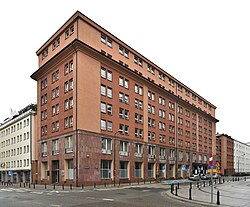This article needs additional citations for verification .(April 2025) |
| Ministerstwo Rodziny, Pracy i Polityki Społecznej | |
 Ministerial logotype | |
 Ministry headquarters at Nowogrodzka Street | |
| Agency overview | |
|---|---|
| Formed | 16 November 2015 |
| Headquarters | ul. Nowogrodzka 1/3/5, Warsaw |
| Agency executive |
|
| Parent agency | Council of Ministers |
| Website | www.mpips.gov.pl |
Ministry of Family, Labour and Social Policy of the Republic of Poland was formed in 2005 to administer issues related to labour and social policy of Poland. It was named Ministry of Labour and Social Policy until late 2015 when it was renamed to Ministry of Family, Labour and Social Policy.
Contents
The ministry was formed from the former and short-lived Ministry of Social Affairs (created from 2004) and still existing, but reduced Ministry of Economy. From the Ministry of Economy, the new ministry acquired the competences in the fields of employment and combating unemployment, relations and conditions of labor, labor-related benefits, and trade union relations. The social policy part of the ministry gives it competences over the issues of family issues, and social benefits and welfare.
The ministry supervises the Zakład Ubezpieczeń Społecznych.
Since December 2023 the current Minister of Labour and Social Policy is Agnieszka Dziemianowicz-Bąk. [1] In April 2024, she appointed a team to reform the National Labour Inspectorate. [2]



